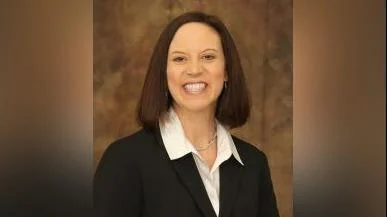State Representative Sharon Chung | ballotpedia.org
State Representative Sharon Chung | ballotpedia.org
According to the Illinois General Assembly site, the legislature summarized the bill's official text as follows: "Amends the Department of Innovation and Technology Act. Provides that by January 1, 2026, the Department of Innovation and Technology shall create a detailed action plan in order to replace the Community Reporting System used by the Department of Human Services' Division of Developmental Disabilities. Requires the Department of Innovation and Technology to work in collaboration with the Department of Human Services to ensure that the new system is operational and in use by providers of home and community-based services by July 1, 2026. Provides that the Department of Human Services shall offer training and technical assistance to providers of home and community-based services prior to implementation of the new system to ensure proper transition. Amends the Department of Human Services Act. Provides that beginning July 1, 2026, the Department of Human Services shall provide each provider of home and community-based services an updated, detailed rate sheet for each individual served in a community-integrated living arrangement by the provider at least annually or when a change to the individualized rate has occurred. Effective July 1, 2025."
The following is our breakdown, based on the actual bill text, and may include interpretation to clarify its provisions.
In essence, the bill mandates the Department of Innovation and Technology to develop an action plan by Jan. 1, 2026, to replace the Community Reporting System used by the Department of Human Services' Division of Developmental Disabilities. It requires collaboration to ensure the new system is operational by July 1, 2026, for providers of home and community-based services, with associated training and technical support. Additionally, starting July 1, 2026, the Department of Human Services must annually provide updated, detailed rate sheets to providers for individuals in community-integrated living arrangements, or whenever individualized rates change. The act is effective July 1, 2025.
Sharon Chung has proposed another five bills since the beginning of the 104th session.
Chung graduated from Illinois Wesleyan University with a BA.
Sharon Chung is currently serving in the Illinois State House, representing the state's 91st House District. She replaced previous state representative Mark Luft in 2023.
Bills in Illinois follow a multi-step legislative process, beginning with introduction in either the House or Senate, followed by committee review, floor debates, and votes in both chambers before reaching the governor for approval or veto. The General Assembly operates on a biennial schedule, and while typically thousands of bills are introduced each session, only a fraction successfully pass through the process to become law.
You can read more about bills and other measures here.
| Bill Number | Date Introduced | Short Description |
|---|---|---|
| HB2491 | 02/03/2025 | Amends the Department of Innovation and Technology Act. Provides that by January 1, 2026, the Department of Innovation and Technology shall create a detailed action plan in order to replace the Community Reporting System used by the Department of Human Services' Division of Developmental Disabilities. Requires the Department of Innovation and Technology to work in collaboration with the Department of Human Services to ensure that the new system is operational and in use by providers of home and community-based services by July 1, 2026. Provides that the Department of Human Services shall offer training and technical assistance to providers of home and community-based services prior to implementation of the new system to ensure proper transition. Amends the Department of Human Services Act. Provides that beginning July 1, 2026, the Department of Human Services shall provide each provider of home and community-based services an updated, detailed rate sheet for each individual served in a community-integrated living arrangement by the provider at least annually or when a change to the individualized rate has occurred. Effective July 1, 2025. |
| HB2373 | 01/31/2025 | Amends the Nurse Practice Act. Provides that one of the criteria that the Board of Nursing shall take into consideration when reviewing a registered professional nurse education program is whether the program satisfies specified criteria in provisions regarding program effectiveness (rather than satisfies the measurement of program effectiveness based on a passage rate of all graduates over the 3 most recent calendar years without reference to first-time test takers). Provides that, in order for a program to obtain initial Department of Financial and Professional Regulation approval and to maintain Department approval, the passage rates of the program's graduating classes on the State-approved licensure exam must meet one of the measurements of program effectiveness (rather than be deemed satisfactory by the Department). Provides that a registered professional nurse education program meeting one of the measurements of program effectiveness shall be deemed in good standing. Provides that the Department may, without hearing, rescind the license of any person who obtained a license or other authorization to practice under the Act based on educational credits received from a registered professional nurse education program that did not meet a set of requirements during the time period when the person obtained the credits. Sets forth requirements for program effectiveness. Effective immediately. |
| HB2349 | 01/30/2025 | Amends the Property Tax Code. Provides that no more than 2 members of the board of review may be affiliated with the same political party (currently, 2 members of the board shall be affiliated with the political party polling the highest vote for any county office in the county). Effective immediately. |
| HB1893 | 01/29/2025 | Creates the Household Hazardous Waste Stewardship Act. Requires manufacturers, beginning January 1, 2027, to implement a stewardship program for covered products. Details manufacturer obligations under the stewardship program, including in the context of a stewardship organization comprised of manufacturers. Requires registration by April 1, 2026, and annually, for each manufacturer who sells covered products in the State and each stewardship organization. Details the roles of retailers and collections sites. Outlines stewardship plan components. Provides requirements for the Environmental Protection Agency for stewardship plan approval. Details requirements for a stewardship organization implementing a stewardship plan, as well as other statewide collection requirements. Details reporting requirements. Requires a stewardship organization to pay to the Agency an annual fee of $200,000, split if there is more than one stewardship organization. Provides for responsibilities for the Agency. Provides for immunity from antitrust laws. Provides for rulemaking authority for the Agency. Provides for civil and criminal penalties. Allows collection of covered products by a premium collection service. Makes findings. Defines terms. Effective immediately. |
| HB1538 | 01/21/2025 | Amends the Sanitary District Act of 1917. Provides that the board of trustees of the Bloomington and Normal Water Reclamation District may enter into an agreement to sell, convey, or disburse treated wastewater to a private entity located within 50 miles of the District's boundaries. Provides that the Bloomington and Normal Water Reclamation District may accept wastewater for treatment from a private entity located within 50 miles of the district's boundaries. Provides that the Bloomington and Normal Water Reclamation District may acquire and accept, by gift, grant, purchase, or otherwise fee simple interest or any lesser interest as may be desired in real property necessary to carry out its powers under the provisions. Effective immediately. |
| HB1358 | 01/14/2025 | Amends the School Code. Creates the Waiver Process Task Force. Sets forth provisions concerning membership, meetings, and support services. Provides that the purposes of the Task Force are to examine the current waiver response process and make recommendations on a more equitable and fair waiver response at the elementary and secondary school levels in this State; develop and use metrics to access the viability of waiver requests and the impact of such requests on students in kindergarten through grade 12; promote training and professional development on creating waiver requests that include accountability measures for teachers and other community stakeholders across this State; identify and seek local, State, and national resources to support an equitable and fair waiver process; and complete such other strategies as may be identified by the Task Force. Provides that the Task Force shall make recommendations to the Governor and the General Assembly on how waivers should be requested, how waivers should be reviewed for approval, and how to demonstrate the ability to fulfill accountability measures proposed in requested waivers. Requires the Task Force to file a report with the Governor and the General Assembly on or before December 31, 2025. Effective immediately. |




 Alerts Sign-up
Alerts Sign-up